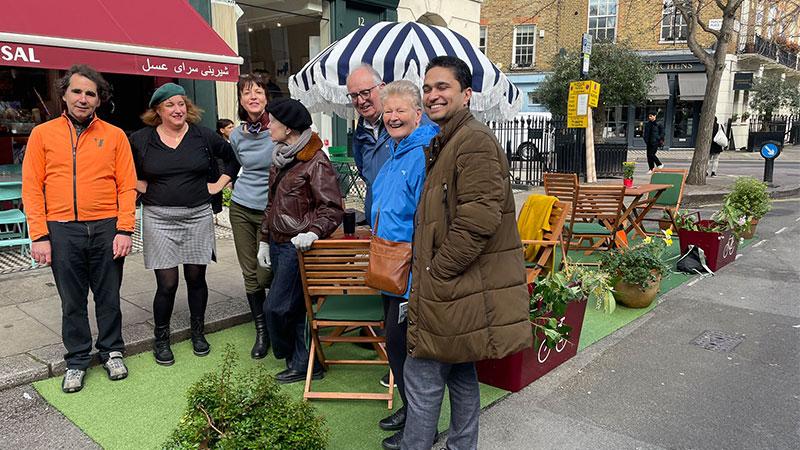On 15 March the University of Westminster set up a pop up parklet in Hyde Park Estate, where members of the public got a taste of what these sustainable spaces have to offer and how they can help support the transition towards a post-car city.

Parklets are a new concept that aim to create community spaces within carparking spots along the street. To transform a parking spot into a parklet people can add benches or planters to encourage passersby to come to the space and socialise with others in their community. Through these parklets, areas can become more walking friendly as they add interesting and greener points along the route, provide shelter from bad weather and give people the opportunity to socialise.
The temporary parklet pop up in Hyde Park Estate was the final event of the EX-TRA project - a collaboration between the University of Westminster and a variety of universities and organisations from across Europe. The project aims to make cities sustainable and accessible without the use of cars and provide effective strategies to manage systematic resistance to changes.
Funded by Urban Europe, the project has experimented in Amsterdam, Bologna, Milan, Ghent, Munich and London to find solutions to the problems that arise in the transition towards a post-car city.
The event was organised in collaboration with Hyde Park Estate Residents (HyPER) and had the support of Westminster officers and councillors. Three ward councillors including Paul Dimoldenberg, as well as the CEO of the Marble Arch Partnership and influencer Carla Francombe, visited the parklet to show their support.
In the visitor’s book one guest said: “Great initiative! People need more free and green and open spaces in towns!”
Dr Tom Cohen, Reader in Transport Policy at the University of Westminster, said: “This pop-up parklet couldn’t have gone better! People who visited loved it; the local shopkeepers were delighted and seemed to be getting more customers; local politicians visited and are very supportive and the community group (HyPER) feel empowered to develop plans for a permanent scheme. I’m delighted that we were able to do this as part of the EX-TRA project, hopefully making a lasting positive impact in the University’s home borough.”
The initiative directly contributes to the United Nations Sustainable Development Goals (SDG) 15: Life on Land, 11: Sustainable Cities and Communities and 13: Climate Action. Since 2019, the University of Westminster has used the SDGs holistically to frame strategic decisions to help students and colleagues fulfil their potential and contribute to a more sustainable, equitable and healthier society.
Find out more about sustainability initiatives at the University of Westminster in the University’s latest Sustainable Development Goals (SDG) report.




